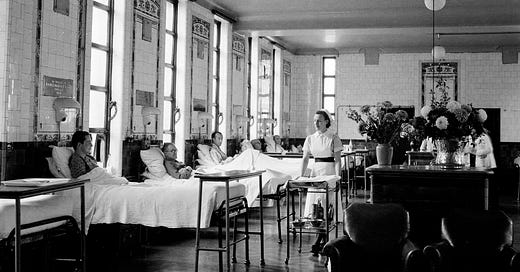Excerpts from Any Human Heart, by William Boyd
Monday, 5 July 1976
One of the old ladies who comes round the ward with puzzle-books and sewing-kits has procured me a biro and writing pad and so finally I am able to log my impressions of this infernal place. Swiss roll and lumpy custard for the third time this week. I'm sorry, but Swiss roll is not a pudding; Swiss roll is a cake. Someone in the catering department is raking off money that should be going to provide proper puddings. Completely typical of this place – built in the 19th century and still redolent of that century’s values and practices. For example Ward C is vast, a huge high-ceilinged room like a village hall or a school chapel, and it was purpose-built as a ward with tall thin windows on three sides to let in as much ‘healing’ sunlight as possible. There are 30 beds in here, twice as many as ever intended, and the nursing staff are overstretched, harried and very short tempered. I spent two weeks marooned in the middle aisle before Paula – the only nurse I like – managed to have me moved to a corner. So now I only have one neighbour – the current occupant, an old wino, leaves much to be desired. These warm sunny July days make the ward cook up like a greenhouse. At mid afternoon we are lying gasping on our beds, running with sweat, those with the energy or power fling back the bed clothes and fan ourselves with magazines and newspapers. I won't dwell on the obnoxious marshy odours that rise up from the exposed sheets. It has provided a small glimpse into the physical conditions of the Victorian age: when you come to think of it everyone must have been intolerably hot in summer – clothes were thicker, people wore many more layers of them, it was considered impolite to remove a jacket. The stench of body odours from both men and women must've been overpowering. Then factor-in all the horse manure in the streets… 19th century London must've stunk like a cesspit.
My leg is enclosed up to the hip in plaster, rendering me more or less immobile. I piss in a bottle and if I want to shit I have to summon a nurse. I refuse to use a bed pan so they have to wheelchair me to the lavatory. There I park myself on the pan and do my business. There are no doors on the stalls. The nurses hate me for not using a bed pan.
The only vaguely pleasurable consequence of my plastered leg is that I have to have a sponge bath. This is done brusquely and efficiently but for two minutes I returned to infancy again –arms are lifted and armpits laved, a cool sponge ducks around my genitals, I lean forward and my back is swabbed. An no-nonsense towlling and a dusting of talcum powder finish off the procedure. If that milkcow Sister Frost heaves out of breast for me to suckle, then the picture would be complete.
The food is disgusting, condemnable – the worst I've eaten since my school days at Abbey. We are provided with every institutional horror imaginable – mince with watery mash and tinned veg.; a fish pie with no fish; curried eggs; jam, dough dumplings with lumpy custard. You have to eat it – especially me, stuck here in my bed. Once a day someone pushes round a trolley and you can buy biscuits and chocolate bars for extra substance. It is a truly terrible diet –everyone complains of constipation.
This is the first time in my life that I have been badly injured and seriously unwell; the first time I've had an operation and a general anaesthetic; the first time I have been in hospital. Those of us who have the luck to enjoy good health forget about this vast parallel universe of the unwell – their daily misery, their Bernal ordeals. Only when you cross the frontier into the world of ill-health do you recognise it's quiet, massive presence, it's brooding permanence.

The plaster came off my leg today – revealing an etiolated, hairy, knobbly thing half the size of its partner. I noticed an odd kink in the skin where the broken bone had not knitted together properly and that had the surgeon frowning. The thigh and calf muscles are almost completely wasted so I am promised two hours of physiotherapy a day to build them up again. I sense an urgency to have done with me, now the physical sign of my incapacity has been removed. The feeling is mutual.
A door has been fitted to one of the laboratory stalls. A small but sweet victory.
Only 20 job adverts for 3,000 newly qualified physiotherapists





“Nothing that I have found draws into question the principles of a health service that is taxpayer funded, free at the point of use, and based on need not ability to pay […] It is not a question, therefore, of whether we can afford the NHS. Rather, we cannot afford not to have the NHS, so it is imperative that we turn the situation around.”